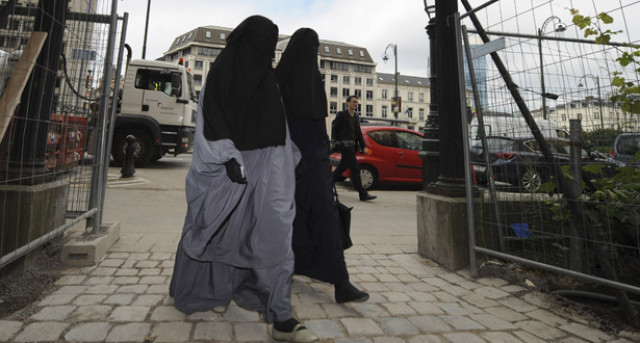Hunt for self: ‘Europe concerned over increasing number of non-European Muslims’
KU organises workshop on the region’s search for identity.

Speaker felt that the rising intolerance was linked with the economic crisis in Europe. PHOTO: REUTERS
He was speaking at a workshop on ‘Politics of Identity in Contemporary Europe: Challenges for the Cultural Coherence of the EU in the Context of National, Ethnic and Ultra Right Politics’ organised by Karachi University’s (KU) Area Study Centre for Europe and the Hans Seidel Foundation, Islamabad, at the university on Thursday. He felt that Europe was making considerable efforts to resolve its economic and immigration problems and advised Pakistan to tackle the problems of terrorism and extremism in the same manner.
A member of KU’s political science department, Prof. Dr Tanveer Khalid, pointed out that European countries were making their immigration laws tougher due to economic stagnation and increasing incidents of violence in the region. “Unemployment and rising immigration levels have gained considerable importance in European politics,” she observed, adding that one of the ways of dealing with these problems was to forge closer economic and political ties with Pakistan.
“Xenophobic movements are increasing in Europe because the Europeans are afraid of being swamped by a sea of aliens,” said the chairperson of the Department of International Relations and Political Science at University of Sargodha, Prof. Rashid Ahmad Khan. He felt that the rising intolerance was linked with the economic crisis in Europe. “Xenophobic polarisation will increase in Europe as the regions gets further entangled in the unemployment crisis,” he said, adding that increasing migration pressures will open up new debates on the future of Europe.
KU’s Prof. Dr Mutahir Ahmed felt that theories such as the clash of civilisations formulated by individuals in the West had contributed to an increase in right-wing politics in Europe over the past two decades. The university’s in-charge of the Area Study Centre for Europe, Prof. Dr Uzma Shujaat pointed out that European identity continued to be defined by the concept of unity and the need to appear as a united force to outsiders.
A research fellow at KU, Sajjad Ahmed, spoke about the element of nationalism in European identity. Scotland, which is a dominion state of the UK, is holding referendums next year which will decide whether or not it separates. “The nationalist movement in Scotland is not as violent as compared to those in other parts of the world,” he said.
Published in The Express Tribune, April 27th, 2013.



















COMMENTS
Comments are moderated and generally will be posted if they are on-topic and not abusive.
For more information, please see our Comments FAQ